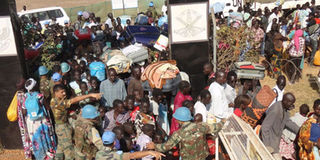Sudan fears South Sudan fighting could affect oil flows

A handout photo released by the United Nations Mission In South Sudan on December 20, 2013 shows civilians gathering outside the UNMISS compound in Juba, on December 16, 2013. PHOTO | UNMISS
What you need to know:
- At least five South Sudanese workers were killed late on Wednesday after unidentified attackers stormed their compound
- The UN said incidents of fighting or civil unrest, which began a week ago in the South's capital Juba, had now spread to 14 separate areas in South Sudan
KHARTOUM
Sudan expressed fears Friday over the fate of vital oil flows as fighting between rival army factions spread in neighbouring South Sudan.
Sudan's cash-starved economy is to receive an estimated $1.5 billion in fees from South Sudan next year for moving crude through northern pipelines for export.
Information Minister Ahmed Bilal Osman expressed concern that the South's oil fields will become victims of the fighting between forces loyal to President Salva Kiir and those of his former vice president, Riek Machar.
"Definitely one of the targets of the two powers, will try to take over the oil fields," perhaps as a way to improve their bargaining position, he said.
"It's a struggle for wealth and power."
At least five South Sudanese workers were killed late on Wednesday after unidentified attackers stormed their compound, operated by the Greater Nile Petroleum Operating Co (GNPOC), a senior executive with the firm said.
But Osman said "so far, there is no effect" on oil flows into Sudan.
"We are very anxious about what is going on in the South. This will affect all the neighbouring countries. In Sudan we are going to suffer even more than the others."
He also expressed fears about an influx of refugees and weapons.
The South became independent from Sudan less than three years ago under a 2005 peace deal that ended 23 years of civil war.
Sudan itself is grappling with violence in its Darfur region, as well as insurgencies in the Kordofan region and Blue Nile state.
On Monday, the United Nations said that almost two million people are displaced in Darfur while, countrywide, 6.1 million need humanitarian assistance.
"We have already some problems in our own country," Osman said, and the Southern violence threatens to make things worse.
"We'll have refugees," Osman said, although there has not yet been any major influx over the 2,000-kilometre (1,240-mile) frontier.
"The availability of weapons will be more," he added.
FIGHTING SPREADS
The UN said incidents of fighting or civil unrest, which began a week ago in the South's capital Juba, had now spread to 14 separate areas in South Sudan.
Late Wednesday troops loyal to the fugitive Machar seized the town of Bor, about 400 kilometres from the disputed border with Sudan. (READ: South Sudan rebels seize Jonglei's capital)
"The worst scenario for us is this war flares in other areas and extends to the whole of the South, and this will have an impact on Sudan," Osman said.
After intermittent border fighting last year, and allegations that the South was supporting rebels in Sudan, relations improved after a September summit between Kiir and Sudan's President Omar al-Bashir.
The two leaders agreed to implement nine security and economic pacts which, among other measures, would open the frontier for trade and implement a demilitarised buffer zone designed to cut cross-border rebel support.
Diplomats agreed that Sudan is looking on with concern.
"I think this potentially could be very threatening to the stability of Sudan, one foreign diplomat said, asking for anonymity.





